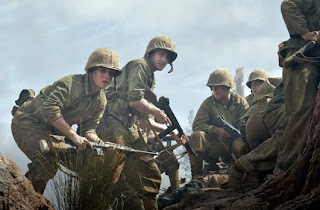Monday, May 17, 2010
Burying the Past to Live in the Present
"How did all this happen?" Eugene Sledge said to his best friend Sidney Phillips outside of a dance in Mobile, Alabama in 1946. Sledge had just returned from the War in the Pacific and was suffering the shellshock and regret a lot of veterans battled.
"I mean, look at us, Sid," he resumed. "Sittin here at a dance, drinking punch, not a scratch on either of us. I mean, what the h*** are we doing here? And why? Why did I end up back here when all of those other fellows didn't?"
Sidney, who had returned from the Pacific two years earlier, knew what his friend was talking about.
"I thought that," he said. "Every guy back has thought that. But you've just got to pull yourself out of bed every morning and get on with your day. If we do that enough times in a row, we forget some things. For a while, anyway."
With that, Sidney was called back to the dance and Sledge was left to continue pondering how he was going to resume life after the War. He had changed. No longer was he the innocent teenager who longed to rush off with his friends to fight in the War. No longer was he the same Southern boy who lived in a large home with a wealthy doctor dad and had every need met. His world was turned upside down by the War — by the violence, the vulgarity, and the fear. Getting shot at and seeing men gunned down before his eyes. Experiencing death, fear, hatred, mud, blood... war.
His best friend's solution? Bury it deep, Gene. Get into a daily routine and let it consume you. And Sledge and thousands of veterans did just that. They became routine oriented in order to deal with their horrific memories. Many did not talk about the war for years — decades. They just couldn't process something so ... beyond words.
This was my experience with one of my grandfathers. My dad's dad served in the Atlantic on a bomber plane and wore his service in the military as a badge of honor. He buried many memories deep inside but was always willing to talk about the War. My mom's dad, however, was not so open about his Pacific War experiences. Growing up, the only times I remember him talking about the Pacific were at the few war reunions his division held. I had the privilege of accompanying he and my grandmother to two of them back before I went away to college.
My grandfather didn't fight on Guadalcanal or Pelieu. He didn't crawl on the black sands of Iwo Jima. Those were the headline battles. Instead, he served on several smaller islands and was to be part of the force assembled on Okinawa tasked with invading Japan. That was until the bombs were dropped. I'm not sure how accurate I am with all this info. You see, he rarely talked about the War. I think my grandmother said more about the War than he ever did.
Until one magical night about five years ago. My grandmother brought out several picture albums she had assembled of wartime pictures and set them on the table. We started talking about the war with her, asking about the pictures. My grandfather, ever in his den recliner, got up, walked over to the table, and started looking at the pictures with us. My grandmother asked him questions about people, places and events and he just suddenly opened up. Thirty minutes or more passed as we absorbed and marveled over his memories of serving in the Pacific. It was one of those moments that stay with you the rest of your life. I wish I had a recorder of ANY kind available but, of course, I didn't. I wasn't prepared for this. Who knew?
He didn't open up again about the war when I was around and passed away last November. Now all I'm left with is the memory of a moment.
My dad's dad wrote a memoir of his time over Europe and gave it to his four children (and me). I cherish it very dearly. He couldn't (wouldn't) talk about some things too horrific to recall but at least left us some record of his service. He passed in 2006.
Both men were very routine-oriented. My mom's dad rose at 5am and went to bed at 8pm. When he returned from the Pacific he enrolled in college, got married, and set off on a long distinguished career as a CPA. Life went on. But the war was buried deep. Just like it was for Sledge, Sid Phillips and other vets of the Pacific. They had to move on somehow. So they filled their days with busyness, routine and ambition in hops of forgetting their war trauma.
Some succeeded. Others did not.
I'm so glad my grandfathers won that battle.
P.S. — In case you really couldn't tell, tonight I finished watching the final part of HBO's "The Pacific." (Thanks, Verizon, for the service!) I have been in tears during many moments of this miniseries and stunned at other points. It was caused me to think about the many forces that shaped that generation of men, the biggest of which was World War II. How they were able to regroup at all after returning home is a marvel to me. And makes me appreciate my grandfathers even more.
.
Subscribe to:
Post Comments (Atom)



0 comments:
Post a Comment